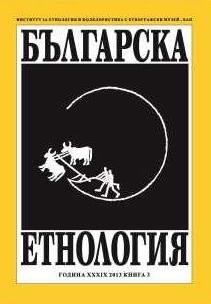Поддържане на родствените отношения при смесени бракове
The maintenance of kinship relationships among mixed marriages
Author(s): Tania MatanovaSubject(s): Anthropology
Published by: Институт за етнология и фолклористика с Етнографски музей при БАН
Summary/Abstract: The present text is focused on the kinship relationships of people, born in interethnic marriages, i.e. upon their communication with relatives of their matrilineage and patrilineage most of who live far away (most often it is the birthplace of one of the parents). For the gaining of empirical data, there are used the methods of the half-structured face-to-face interviews – part of which conducted online through the Skype program or through email-exchange. Some of the respondents have received an extra questionnaire, in order to get an account to their personal kinship social network. Their answers have been analyzed through the program Vennmaker. The results of the research make clear that, within the migrant mixed families, kinship relationships have played an important role in the processes of adaption to the culture of origin and to the culture of residence. They are formed in the period of children’s upbringing and are maintained and developed in the years after that. Concerning the kinship ties of the respondents, it could be said that – in similarity to their parents, they maintain the contact with their relatives in two ways: through travels and visits and through exchange of letters and greeting cards, phone calls, online conversations, etc. So, the visits are not seized despite the possibilities for virtual proximity created by the new communication technologies. This continuity is caused by the need to face the face, to face the place and to face the moment, all of which could not be replaced by the virtual presence or the virtual communication. A graphical map of the respondents’ kinship relationships informs that some of the relatives are scattered also in other European countries and in North America and Asia as well. Thus, their social ties and social networks become not only transnational but also transcontinental. Seen from a more global view, the respondents’ families and relatives, similar to other (trans)migrants become more and more deterritorialized. The same could be said also about their cultures of origin, because they unconsciously or deliberately practice their language competence, culturally adopted nutritional habits, different calendar feasts, and other cultural elements of their ethnic communities of origin.
Journal: Българска етнология
- Issue Year: 2013
- Issue No: 3
- Page Range: 369-387
- Page Count: 19
- Language: Bulgarian

